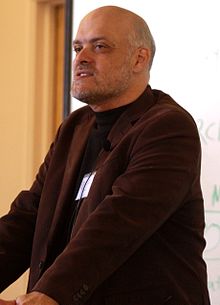Gary Chartier
| Gary William Chartier | |
|---|---|
 |
|
| Born |
December 30, 1966 Glendale, California |
| Education | BA in history and political science (La Sierra University, 1987) PhD in ethics, theology, and the philosophy of religion (University of Cambridge, 1991) JD (UCLA, 2001) LLD (higher doctorate of law; University of Cambridge, 2015) |
| Notable work | Anarchy and Legal Order (2013), The Conscience of an Anarchist (2011) |
| Era | Contemporary philosophy |
| Region | Western philosophy |
| School | Analytic philosophy, natural law, process philosophy |
|
Main interests
|
Anarchism, left-libertarianism, meta-ethics, applied ethics, political philosophy, philosophy of religion, philosophical theology |
|
Influences
|
|
Gary William Chartier (born December 30, 1966) is an American legal scholar who is Distinguished Professor of Law and Business Ethics and Associate Dean of the Tom and Vi Zapara School of Business at La Sierra University in Riverside, California.
Chartier was born on December 30, 1966, in Glendale, California, at what is now Glendale Adventist Medical Center, to physician Stanley E. Chartier and Helen L. Bloodworth Chartier, later a realtor. His parents were socially conservative Seventh-day Adventists; his physician father had previously worked as an accountant and had taught the subject at local colleges. When Chartier was in high school he became interested in political theory after reading books by Robert Nozick, Murray Rothbard, Robert Anton Wilson, and Friedrich Hayek. He appeared as a guest on Wally George's Hot Seat television show in 1986 to defend an anarchist manifesto he submitted to the show's producers.
Chartier received a bachelor's degree at what is now La Sierra University in 1987; he graduated magna cum laude and received the University President's Award. Though he had majored in history and political science, his undergraduate study of philosophy and religion led to his enrollment in a doctoral program in the philosophy of religion and theology at what was then Claremont Graduate School. While at Claremont, where he studied under John Hick, he applied and was accepted into a PhD program in the Faculty of Divinity at the University of Cambridge, where his teachers included Nicholas Lash and Brian Hebblethwaite, and from which he was graduated in 1991. His dissertation, supervised by Hebblethwaite, focused on the idea of friendship; his examiners were Stephen R. L. Clark and Michael Banner. By this time, his political views had taken a conventionally social democratic turn.
...
Wikipedia
